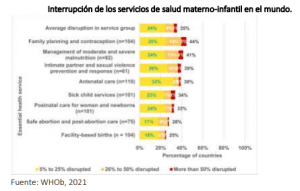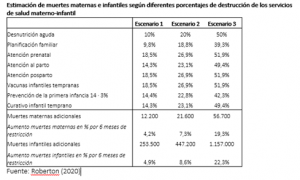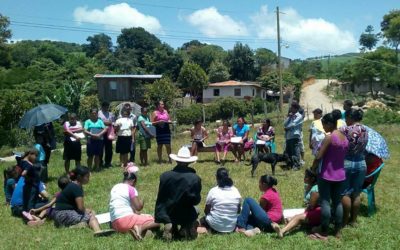The Waal Foundation’s ABCD Prenatal campaign contemplates planning, pregnancy and the baby’s first two years of life, following four prevention keys. In this article we will review the incidence of the health crisis on these axes.
As we established in our previous article Effects and projections of the health crisis , the figures on mortality and poverty are high and worrying. Below we can see its impact on maternal and child health.
EAT WELL
Achieving adequate nutrition for children is a difficult objective at the present time, due to the decrease in family income, difficulty in accessing food, reduction in the quantity-quality of diets and the lack of attendance at educational centers.
Although few data have come out, it is clear that the indicated affectations lead to a worsening in the indicators of malnutrition, weight loss, overweight, delayed intrauterine growth and low birth weight. Anemia has also been reported in pregnant women, according to the Development Initiatives report, 2020 , by UNICEF, WHO and the World Bank. The pandemic in turn affected the suspension of 50% of services provided in health centers. In addition, nutritional assessments before and during pregnancy have decreased and therefore the provision of nutritional supplements or specific support with nutritional diets.
SEEK MEDICAL ATTENTION
The reduction in health care for pregnant women and babies has had negative effects on maternal and newborn health, especially in the poorest countries and households.
According to the Second Pulse Survey on the continuity of essential health services during the COVID-19 pandemic According to the WHO (2021), around 90% of the countries have reported one or more changes in essential health services, with Latin America being the region with the greatest interruption in maternal and child health services, above Africa. In addition, it has the highest percentage of affected services, with more than 50% of these suspended at some point in the pandemic.
In the specific case of reproductive, maternal, neonatal, child, adolescent and nutrition health services, the report indicates that, on average, 35% of the countries reported interruptions. The services with the greatest interruption were family planning and the management of malnutrition according to the WHO report mentioned above.
BEWARE OF ASSAULT
Although the virus is unlikely to directly affect the fetus, fetal distress can occur when the mother becomes seriously ill with a fever and respiratory complications or when there are pre-existing secondary health conditions. These pathologies can cause congenital malformations and other deficiencies and even result in epigenetic changes.
In addition, an increase in women who do not seek timely medical attention has been reported, which increases obstetric emergencies and causes difficulties for the newborn and the mother. Likewise, several studies have indicated an increase in postpartum depression and maternal anxiety, as indicated in “Effects of the COVID-19 pandemic on maternal and perinatal outcomes: a systematic review and meta-analysis” , published in The Lancet, 31 March 2021.
One aspect to consider is also the increase in violence that has been registered within some homes, in the context of prolonged confinement. Overcrowding situations, in addition to increasing the risk of exposure to the virus, can lead to an increase in domestic violence towards children, adolescents and women and “pregnancies due to rape, which by definition are unintentional, and others causing toxic stress, “says the article Challenges of the COVID-19 pandemic in the health of women, children and adolescents in Latin America and the Caribbean , from UNDP and Unicef, published in August 2020.

GIVE LOVE
Before the pandemic, in the countries where we work and Peru, between 66% and 79% of women who wanted to avoid getting pregnant used modern contraceptive methods. But these figures could have decreased between 40% and 48%, negatively affecting the indicator of planned pregnancies, including teenage pregnancies.
To this we must add that Latin America has the highest rate of unintended pregnancies in the world, estimated at 63% of a total of 17 million pregnancies. Unplanned pregnancies can result in one birth (56%), induced abortion (29%), or spontaneous abortion (14%). (Adding It Up: Investing in Sexual and Reproductive Health 2019, Sully E. ).
Although there are still no data on early attachment and postpartum breastfeeding, it has been seen that on many occasions medical personnel have promoted, without clinical reasons, the separation between mother and newborn, as well as formula feeding .
Instead of promoting attachment and breastfeeding, aspects that are essential for the integral development of the newborn and the postpartum recovery of the mother.
In the midst of a health emergency situation such as the current one, these two options can be essential to avoid malnutrition in babies, postpartum depression in the mother and boost the immune system of newborns, among other benefits.
What can happen to maternal and child health?
According to the estimates of COVID-19: Responses from Social Protection in Latin America and the Caribbean , families with children and young people, women, especially heads of households and children and adolescents are the most affected groups due to the Covid-19 crisis.
The document expresses its concern about the long-term impacts of the pandemic and urges states to focus their actions on guaranteeing basic rights, with a comprehensive perspective.
“If governments They do nothing to strengthen social protection from a systemic approach, one out of every two children in Latin America and the Caribbean could live in households without the necessary income to cover their essential needs. This would imply almost 20 million additional children in poverty, who would be mainly in South America (just over 13 million), then in Central America and Mexico (almost 5 million), and the rest in the Caribbean countries (1.2 million) “, he points out. the website.
Estimates made at the beginning of the pandemic with global data from low- and middle-income countries, including 34 countries and territories in Latin America and the Caribbean. They indicate that a 10% reduction in the use of sexual and reproductive health services could mean, according to the journal International Perspectives on Sexual and Reproductive Health (Riley et al., 2020):
- 1.7 million women with obstetric complications,
- 2.59 million newborns experiencing major complications.
- 28,000 maternal deaths,
- 168,000 additional neonatal deaths.
While the report Early Estimates of the Indirect Effects of the COVID-19 Pandemic on Maternal and Child Mortality in Low- and Middle-Income Countries: A Modeling Study (Roberton, 2020), using the instrument ´Lives Saved Tool´ (LiST), calculated the effects of a decrease in access to essential services for maternal and child health in the following three scenarios.

Lack of compliance with sexual and reproductive health and rights jeopardizes many of the progress made in reducing preventable maternal and child mortality and adolescent health.
In addition, it risks the fulfillment of the Sustainable Development Goals (SDG) to 2030, with respect to the goals of maternal deaths, neonatal and infant deaths. With a 25% reduction in access to health services, all countries will have serious difficulties in meeting the goals of 77 maternal deaths per 100,000 live births, 12 neonatal deaths per 1,000 births, and 25 infant deaths per 1,000 births (Castro 2020).
Covid-19 has generated many difficulties and setbacks in aspects of economic and social development. However, it has also offered opportunities to recognize implicit vulnerabilities in the relationship between the inter-connectivity of societies, environmental stress and economic and social inequities. The visibility of these underlying problems allows a better analysis to formulate the most appropriate solutions. (GPMB-WHO, 2020).
Faced with this situation, the FDW proposes to strengthen investment in a culture of prevention with a holistic, interdependent, interdisciplinary and intersectoral perspective. Only from this vision can correct actions be built that benefit the greatest number of people and above all, unborn babies. A set of actions is needed that includes strong governance with community participation, investments to strengthen health systems, adopting ecological measures. Improve underlying health determinants and strengthen multisectoral coordination at the national and international levels.
The FDW responds to these needs, promoting:
- Changes of behavior at the individual / family / relationship level in favor of health and the environment,
- Institutional and systemic changes according to the socio-ecological model.
- Improvements in basic living conditions / resilience: equity, capacity for continuous response and adaptation, level of health and prosperity.
🔎 Check here ⬇️⬇️ our report THE SCENARIO OF COVID-19 IN LATIN AMERICA.
Sources:
Development Initiatives, 2020 .
Second Pulse Survey on the continuity of essential health services during the COVID-19 pandemic .
Adding It Up: Investing in Sexual and Reproductive Health 2019, Sully E
COVID-19: Responses from Social Protection in Latin America and the Caribbean
Photo by Marcin Jozwiak on Unsplash



